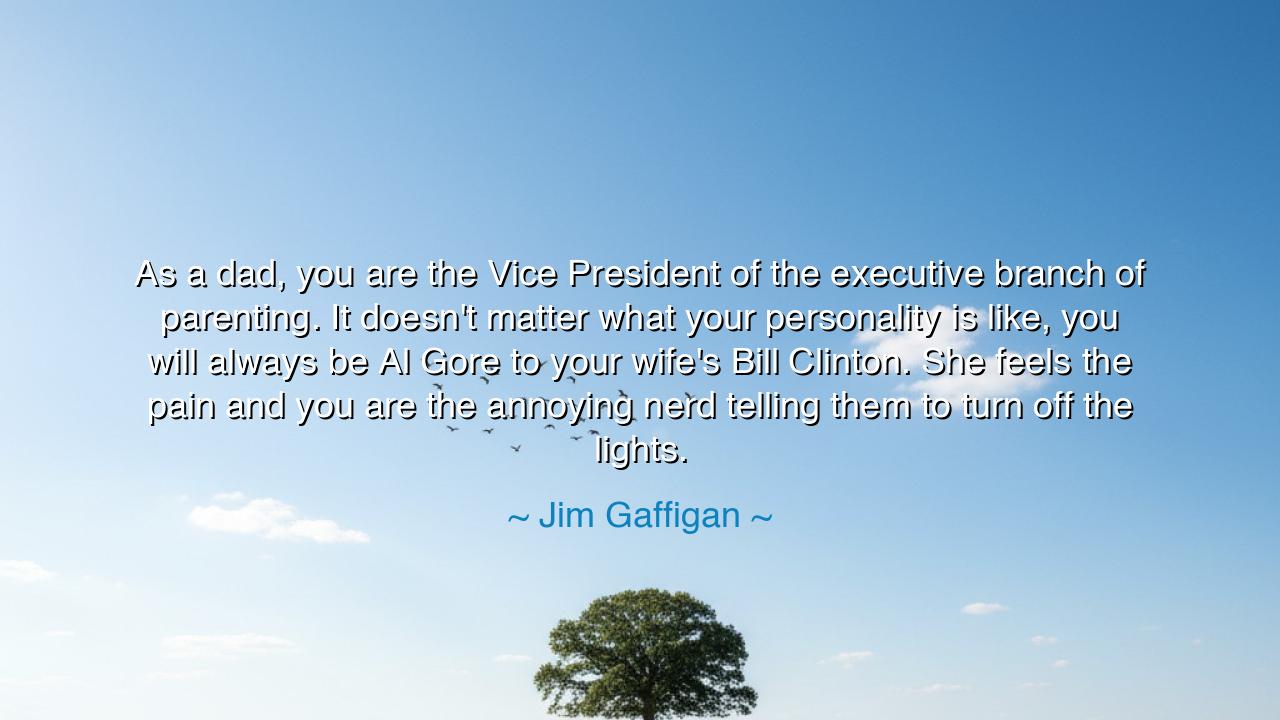
As a dad, you are the Vice President of the executive branch of
As a dad, you are the Vice President of the executive branch of parenting. It doesn't matter what your personality is like, you will always be Al Gore to your wife's Bill Clinton. She feels the pain and you are the annoying nerd telling them to turn off the lights.





Hearken, O children of future generations, and attend to the words of Jim Gaffigan, whose humor carries a deep truth about the nature of fatherhood: “As a dad, you are the Vice President of the executive branch of parenting. It doesn’t matter what your personality is like, you will always be Al Gore to your wife’s Bill Clinton. She feels the pain and you are the annoying nerd telling them to turn off the lights.” Beneath the laughter lies a profound reflection on the dynamics of responsibility, partnership, and the uncelebrated labor of love that defines a father’s role.
In the annals of the ancients, fatherhood was never merely the passing down of lineage; it was an office of service, guidance, and counsel. The father, like the Vice President, may not always receive the applause of the crowd, yet his presence ensures the functioning and balance of the household, the quiet orchestration of order amidst chaos. Gaffigan’s words remind us that fathers are called not always to glory, but to steadfast participation, often in the background, bearing burdens without the fanfare that accompanies their spouse’s triumphs.
Consider the life of Marcus Aurelius, emperor and father. Though he ruled an empire with absolute authority, his wisdom in raising children was exercised with patience and counsel, often behind the scenes. Like Gaffigan’s metaphorical Vice President, Marcus guided, corrected, and nurtured, while the weight of public attention and immediate responsibility often rested elsewhere. The greater lesson is timeless: a father’s influence is measured less by visibility and more by the quiet, consistent care he provides.
The humor in Gaffigan’s reflection masks a deeper truth: parenting is an arena of negotiation, patience, and humility. The father, tasked with reminders and small corrections—the “turning off the lights,” the “annoying nerd” of domestic life—performs duties that are essential yet often overlooked. The world sees the mother’s tireless engagement with the immediate pains and joys of children, but the father’s role, though less celebrated, upholds the structure and rhythm of the family, like a silent pillar supporting a temple of love.
History offers other exemplars of such silent labor. Consider Abraham Lincoln, who, though often absent due to the burdens of the presidency, left behind countless letters of guidance, encouragement, and wisdom to his sons. He may not have been at every moment of their lives, yet his role, like Gaffigan’s Vice President, shaped character, nurtured values, and offered counsel, often unseen but deeply felt. Fatherhood is thus a delicate balance of visibility and subtle influence, humility and duty.
From this reflection emerges a lesson for all who bear the title of parent: embrace your role, however unsung it may be, and honor the partnership that sustains the household. Like the Vice President, your influence is real and consequential, even if it is quiet, corrective, or seemingly mundane. Your patience, your reminders, your consistent care are the invisible threads that hold the tapestry of family life together, shaping the hearts and minds of those you love.
Practical guidance flows naturally from this wisdom. Participate fully, even in the small tasks and annoyances. Recognize that the balance of parenting is a shared endeavor, and that strength and love are often expressed in persistence, not applause. Support your partner, acknowledge their sacrifices, and remember that your influence—though sometimes subtle—creates the framework in which children flourish and households thrive.
Thus, O children of ages to come, remember the teaching in Gaffigan’s words: that fatherhood is both an honor and a humble office, a role of influence and correction, laughter and patience. Strive to embody the steadfast, supportive, and often unseen virtues of the Vice President, guiding with wisdom, correcting with love, and serving with humility. In this way, the office of fatherhood becomes a sacred trust, shaping generations through quiet, consistent, and enduring devotion.






AAdministratorAdministrator
Welcome, honored guests. Please leave a comment, we will respond soon